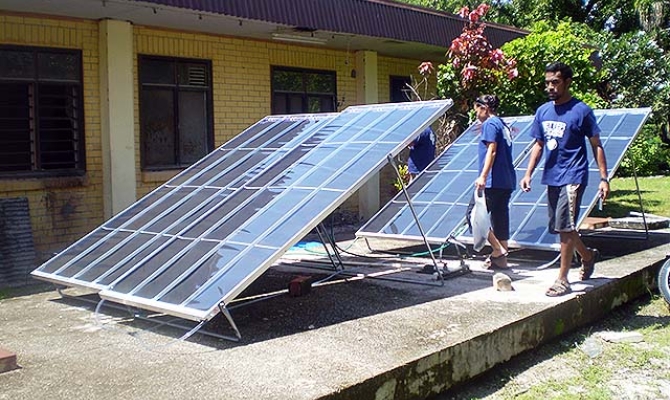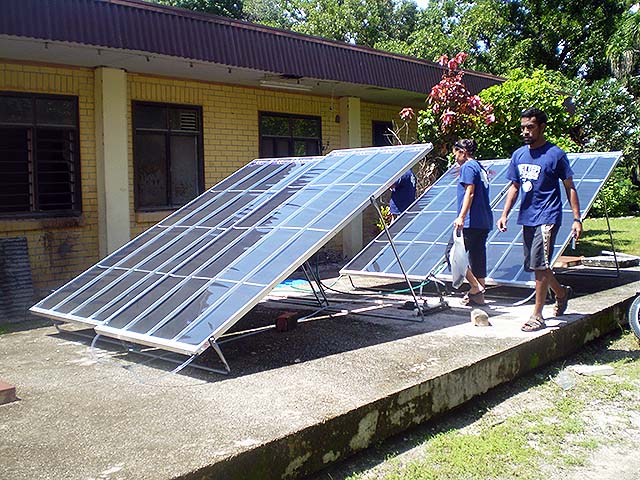
Climate Change Resilience
Climate change concerns dominated the recent 44th Pacific Islands Forum meeting in the Marshall Islands, so delegates were encouraged to hear some success stories from adaptation projects underway in the region. Teams from the Federated States of Micronesia (FSM), the Marshall Islands and Palau described practical measures being implemented in their countries under the Pacific Adaptation to Climate Change (PACC) programme, in a well-attended side event hosted by SPREP and opened by DG David Sheppard.
The theme for the high-level meeting in Majuro, which drew delegates from across the region including New Zealand and Australia, was ‘Marshalling the Pacific response to the climate challenge’. According to Joseph Cain, PACC national coordinator in the Marshall Islands, “we are already marshalling adaptation on the ground through the PACC project, and would like to share with these leaders what we did and how we did it.”
In his presentation Joe described project activities in the Marshall Islands, which focus on improving water systems and water storage in the drought-vulnerable nation. He engaged onlookers with a practical demonstration of how to produce drinking water from contaminated or saline water using solar power. This was first trialled in a separate PACC project in Nauru, and following its success other countries are now looking to introduce this innovative technology. “We can produce 20–30 litres of water per day per solar panel,” explained Joe. “This will be particularly useful for islands that have limited and contaminated groundwater, as well as during drought periods.”

Solar Water Purifier (photo: PACC Nauru)
In Palau, the PACC project has a different focus – addressing food security in coastal communities where farmlands are being inundated by saltwater. Thomas Taro, who leads the Palau PACC team, talked about on-the-ground measures to counter the threat, which include introducing salt-tolerant varieties of taro and improving field drainage through constructing dikes. Several varieties of taro have been selected in field trials, and Thomas brought along samples for tasting.
Simpson Abraham, who coordinates the PACC project in FSM, focused on yet another aspect of climate change adaptation – the mainstreaming of climate change into national legislation. His project has been particularly successful in this respect, as he explained to interested delegates. “We developed a climate change legislation that was enacted into [Kosrae] State Law 10-2 back in 2011. This Act allowed us to make amendments to the State Regulations for Development Projects 2013.” The FSM team has now turned its attention to Kosrae State’s Environmental Impact Assessment Guidelines, which are being revised to ensure climate change risks are addressed in any future developments in the State.
The projects showcased at the meeting are just three of 14 projects under the PACC programme, which are demonstrating practical adaptation measures in 14 Pacific island countries and territories. The projects aim to reduce vulnerability of communities to climate change, and focus on three key climate-sensitive sectors: coastal zone management, food production and food security, and water resources management.
The PACC programme is funded by the Global Environment Facility and the Australian Government with support from the United Nations Institute for Training and Research (UNITAR) Climate Change Capacity Development (C3D+).The Secretariat of the Pacific Regional Environment Programme (SPREP) is the implementing partner, and the United Nations Development Programme acts asimplementing agency.
For more information please contact [email protected]
The theme for the high-level meeting in Majuro, which drew delegates from across the region including New Zealand and Australia, was ‘Marshalling the Pacific response to the climate challenge’. According to Joseph Cain, PACC national coordinator in the Marshall Islands, “we are already marshalling adaptation on the ground through the PACC project, and would like to share with these leaders what we did and how we did it.”
In his presentation Joe described project activities in the Marshall Islands, which focus on improving water systems and water storage in the drought-vulnerable nation. He engaged onlookers with a practical demonstration of how to produce drinking water from contaminated or saline water using solar power. This was first trialled in a separate PACC project in Nauru, and following its success other countries are now looking to introduce this innovative technology. “We can produce 20–30 litres of water per day per solar panel,” explained Joe. “This will be particularly useful for islands that have limited and contaminated groundwater, as well as during drought periods.”

Solar Water Purifier (photo: PACC Nauru)
In Palau, the PACC project has a different focus – addressing food security in coastal communities where farmlands are being inundated by saltwater. Thomas Taro, who leads the Palau PACC team, talked about on-the-ground measures to counter the threat, which include introducing salt-tolerant varieties of taro and improving field drainage through constructing dikes. Several varieties of taro have been selected in field trials, and Thomas brought along samples for tasting.
Simpson Abraham, who coordinates the PACC project in FSM, focused on yet another aspect of climate change adaptation – the mainstreaming of climate change into national legislation. His project has been particularly successful in this respect, as he explained to interested delegates. “We developed a climate change legislation that was enacted into [Kosrae] State Law 10-2 back in 2011. This Act allowed us to make amendments to the State Regulations for Development Projects 2013.” The FSM team has now turned its attention to Kosrae State’s Environmental Impact Assessment Guidelines, which are being revised to ensure climate change risks are addressed in any future developments in the State.
The projects showcased at the meeting are just three of 14 projects under the PACC programme, which are demonstrating practical adaptation measures in 14 Pacific island countries and territories. The projects aim to reduce vulnerability of communities to climate change, and focus on three key climate-sensitive sectors: coastal zone management, food production and food security, and water resources management.
The PACC programme is funded by the Global Environment Facility and the Australian Government with support from the United Nations Institute for Training and Research (UNITAR) Climate Change Capacity Development (C3D+).The Secretariat of the Pacific Regional Environment Programme (SPREP) is the implementing partner, and the United Nations Development Programme acts asimplementing agency.
For more information please contact [email protected]